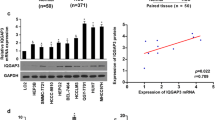Abstract
Metastasis has been one of the major reasons for cancer-related mortality, with multiple genes and pathways being involved in this complex process. Given the molecular variations underlying metastasis of hepatocellular carcinoma (HCC) remains largely unknown; in our previous work, we found copying number of protocadherin-17 (PCDH-17) was significantly deleted in HCC tissues that occurred to metastasize compared with that in the primary HCC without metastasis. Therefore, we hypothesized that PCDH-17 may suppress the metastasis of HCC. There has been, however, no relevant literature available regarding PCDH-17 in HCC. In the present study, we have immunohistochemically detected and clinicopathologically analyzed the expression of PCDH-17 in vivo in clinical tissues; besides, we have explored the role of PCDH-17 ex vivo using a panel of HCC cell lines. It was discovered that PCDH-17 expression was clinically correlated with overall prognosis as well as metastasis in vivo and that PCDH-17 inhibited metastasis via EGFR/MEK/ERK signaling pathway ex vivo. Together, our results obtained both in vivo and ex vivo suggested that activation of EGFR/MEK/ERK signaling pathway through PCDH-17 promotes metastasis in HCC.






Similar content being viewed by others

References
Amal H, Ding L, Liu BB, Tisch U, Xu ZQ, Shi DY, et al. The scent fingerprint of hepatocarcinoma: in-vitro metastasis prediction with volatile organic compounds (VOCs). Int J Nanomedicine. 2012;7:4135–46.
Lin YL, Xie PG, Wang L, Ma JG. Aberrant methylation of protocadherin 17 and its clinical significance in patients with prostate cancer after radical prostatectomy. Med Sci Monit Intx Med J Exp Clin Res. 2014;20:1376–82.
Wang XB, Lin YL, Li ZG, Ma JH, Li J, Ma JG. Protocadherin 17 promoter methylation in tumour tissue from patients with bladder transitional cell carcinoma. J Int Med Res. 2014;42(2):292–9.
Hu X, Sui X, Li L, Huang X, Rong R, Su X, et al. Protocadherin 17 acts as a tumour suppressor inducing tumour cell apoptosis and autophagy, and is frequently methylated in gastric and colorectal cancers. J Pathol. 2013;229(1):62–73.
Yang Y, Liu J, Li X, Li JC. PCDH17 gene promoter demethylation and cell cycle arrest by genistein in gastric cancer. Histol Histopathol. 2012;27(2):217–24.
Krishna K, Redies C. Expression of cadherin superfamily genes in brain vascular development. J Cereb Blood flow Metab Off J Int Soc Cereb Blood Flow Metab. 2009;29(2):224–9.
Stoeckli ET. Protocadherins: not just neuron glue, more too! Dev Cell. 2014;30(6):643–4.
Abrahams BS, Tentler D, Perederiy JV, Oldham MC, Coppola G, Geschwind DH. Genome-wide analyses of human perisylvian cerebral cortical patterning. Proc Natl Acad Sci U S A. 2007;104(45):17849–54.
Biswas S, Jontes JD. Cloning and characterization of zebrafish protocadherin-17. Dev Genes Evol. 2009;219(5):265–71.
Liu Q, Chen Y, Pan JJ, Murakami T. Expression of protocadherin-9 and protocadherin-17 in the nervous system of the embryonic zebrafish. Gene Expr Patterns GEP. 2009;9(7):490–6.
Chen Y, Londraville R, Brickner S, El-Shaar L, Fankhauser K, Dearth C, et al. Protocadherin-17 function in zebrafish retinal development. Dev Neurobiol. 2013;73(4):259–73.
Haruki S, Imoto I, Kozaki K, Matsui T, Kawachi H, Komatsu S, et al. Frequent silencing of protocadherin 17, a candidate tumour suppressor for esophageal squamous cell carcinoma. Carcinogenesis. 2010;31(6):1027–36.
Costa VL, Henrique R, Danielsen SA, Eknaes M, Patricio P, Morais A, et al. TCF21 and PCDH17 methylation: an innovative panel of biomarkers for a simultaneous detection of urological cancers. Epigenetics Off J DNA Methylation Soc. 2011;6(9):1120–30.
Giefing M, Zemke N, Brauze D, Kostrzewska-Poczekaj M, Luczak M, Szaumkessel M, et al. High resolution arrayCGH and expression profiling identifies PTPRD and PCDH17/PCH68 as tumor suppressor gene candidates in laryngeal squamous cell carcinoma. Gene Chromo Can. 2011;50(3):154–66.
Luo ZG, Li ZG, Gui SL, Chi BJ, Ma JG. Protocadherin-17 promoter methylation in serum-derived DNA is associated with poor prognosis of bladder cancer. J Int Med Res. 2014;42(1):35–41.
Charles CA, Tomic-Canic M, Vincek V, Nassiri M, Stojadinovic O, Eaglstein WH, et al. A gene signature of nonhealing venous ulcers: potential diagnostic markers. J Am Acad Dermatol. 2008;59(5):758–71.
Hager MH, Morley S, Bielenberg DR, Gao S, Morello M, Holcomb IN, et al. DIAPH3 governs the cellular transition to the amoeboid tumour phenotype. EMBO Mol Med. 2012;4(8):743–60.
Klein PJ, Schmidt CM, Wiesenauer CA, Choi JN, Gage EA, Yip-Schneider MT, et al. The effects of a novel MEK inhibitor PD184161 on MEK-ERK signaling and growth in human liver cancer. Neoplasia. 2006;8(1):1–8.
Chen D, Zhao P, Li SQ, Xiao WK, Yin XY, Peng BG, et al. Prognostic impact of pERK in advanced hepatocellular carcinoma patients treated with sorafenib. Eur J Surg. 2013;39(9):974–80.
Holmseth S, Zhou Y, Follin-Arbelet VV, Lehre KP, Bergles DE, Danbolt NC. Specificity controls for immunocytochemistry: the antigen preadsorption test can lead to inaccurate assessment of antibody specificity. J Histochem Cytochem. 2012;60(3):174–87.
Hewitt SM, Baskin DG, Frevert CW, Stahl WL, Rosa-Molinar E. Controls for immunohistochemistry: the Histochemical Society’s standards of practice for validation of immunohistochemical assays. J Histochem Cytochem. 2014;62(10):693–7.
Baker M. Reproducibility crisis: blame it on the antibodies. Nature. 2015;521(7552):274–6.
Acknowledgments
The work was supported by the Department of Hepatobiliary Surgery, Lanzhou General Hospital of People’s Liberation Army.
Conflicts of interest
None
Author information
Authors and Affiliations
Corresponding authors
Additional information
Zheng Dang, Jianying Shangguan and Chao Zhang contributed equally to this work.
Electronic supplementary material
Below is the link to the electronic supplementary material.
Supplementary Table 1
The siRNA sequence of PCDH-17 (NM_001040429.2) (DOCX 13 kb)
Rights and permissions
About this article
Cite this article
Dang, Z., Shangguan, J., Zhang, C. et al. Loss of protocadherin-17 (PCDH-17) promotes metastasis and invasion through hyperactivation of EGFR/MEK/ERK signaling pathway in hepatocellular carcinoma. Tumor Biol. 37, 2527–2535 (2016). https://doi.org/10.1007/s13277-015-3970-5
Received:
Accepted:
Published:
Issue Date:
DOI: https://doi.org/10.1007/s13277-015-3970-5



